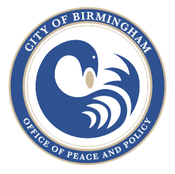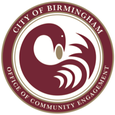Birmingham Office of Peace & Policy: Difference between revisions
No edit summary |
No edit summary |
||
| (4 intermediate revisions by the same user not shown) | |||
| Line 1: | Line 1: | ||
[[File:Bham Office of Peace and Policy logo.png|right|175px]] | [[File:Bham Office of Peace and Policy logo.png|right|175px]] | ||
The '''Birmingham Office of Peace & Policy''' (formerly the '''Birmingham Mayor's Office of Community Policing and Revitalization''' and the '''Birmingham Office of Community Engagement''') is an administrative office of the [[City of Birmingham]], located at 1200 [[Tuscaloosa Avenue Southwest]]. | The '''Birmingham Office of Peace & Policy''' (formerly the '''Birmingham Weed & Seed Task Force''', the '''Birmingham Community Policing and Revitalization Division''', the '''Birmingham Mayor's Office of Community Policing and Revitalization''' and the '''Birmingham Office of Community Engagement''') is an administrative office of the [[City of Birmingham]], located at 1200 [[Tuscaloosa Avenue Southwest]]. | ||
The | The Birmingham Weed & Seed Task Force began operating in the 1990s as a program of the [[Birmingham]] [[Birmingham Police Department|Police Department]] with grant funding from the U.S. Department of Justice, and in coordination with the [[Jefferson County Committee for Economic Opportunity]]. It operated as part of the Department's Investigative Bureau, headed by [[Terrie Lee-Burrell]], with offices at the [[Birmingham Police Department East Precinct|East Precinct headquarters]] in [[Roebuck]]. | ||
[[Image:WeedSeedlogo.png|left|thumb|115px]] | |||
The grant program was designed to "weed" out harmful elements like gang and drug activity, from struggling neighborhoods and to "seed" the community with social services, communication links and goodwill between the police department and the public. | |||
The office was restructured in [[2018]] by [[Mayor of Birmingham|Mayor]] [[Randall Woodfin]] to develop and implement strategies aimed at reducing violence and promoting public health. | The first community to participate in Birmingham Weed & Seed was [[West End]], which began in the early 1990s. [[Northside]] began participating with its own slate of programs in [[2006]]. That community, made up of the [[Central City neighborhood|Central City]], [[Druid Hills]], and [[Norwood]] neighborhoods, sponsored a citizen police academy, a personal finance seminar, and co-sponsored the Central City neighborhood's "[[1040 Fest]]". A [[November 26]], [[2007]] forum at [[Birmingham City Hall]] was held to present the program's requirements and benefits to leaders from other neighborhoods. | ||
[[Randall Woodfin]] worked with the program staff for the Birmingham Weed & Seed Task Force in the early 2000s. | |||
<!--The task force also coordinated the Investigative Bureau's "Highway Interdiction Unit" which patrolled area highways for drug traffickers. On [[September 13]], [[2006]] officers of the Highway Interdiction Unit seized nearly $1 million in cash from a hidden compartment in a truck which was stopped on [[I-20]]-West near [[Leeds]].--> | |||
On [[January 24]]-[[January 25|25]], [[2007]], as part of the Northside Community Weed & Seed Program, members of the non-profit Economic Development Council toured the [[Central City neighborhood|Central City]], [[Druid Hills neighborhood|Druid Hills]], and [[Norwood neighborhood|Norwood]] neighborhoods and met with local public officials to develop ideas about realistic development opportunities in those areas. The group's visit concluded with a public forum at the [[Birmingham Public Library]]. | |||
In [[2015]], with the support of Police Chief [[A. C. Roper]] the office was awarded additional federal grant funding as part of the DOJ's "National Initiative for Building Community Trust and Justice". That grant, which dovetailed with separate "Project Safe Neighborhoods" funding to saturate "hot spots" with law enforcement, provided opportunities for training police in community engagement, bias recognition and de-escalation of violence. | |||
[[File:Bham Office of Community Engagement logo.png|left|thumb|115px]] | |||
Under the leadership of director [[Andre Watson]]<!--[[Andrea’ Watson]], [[Willie Watson]]?--> the officers assigned to the office worked to cultivate relationships with members of the [[Woodlawn]] community to more effectively reduce prostitution and gang activities. Those officers shifted their attentions to [[West End]] in early [[2017]] and the office moved to its present location, the former [[JCCEO Community Services]] building, in April [[2017]]. | |||
The office was restructured in [[2018]] by [[Mayor of Birmingham|Mayor]] [[Randall Woodfin]] to develop and implement strategies aimed at reducing violence and promoting public health. The updated program was patterned after Milwaukee, Wisconsin's "Blueprint for Peace". | |||
The office is headed by [[Brandon Johnson]]. It is funded by the City and by grants, and partners with the U.S. Department of Justice and the [[Jefferson County Department of Health]] for certain programs. The office's logo refers to the West African symbol for "sankofa," expressing the importance of looking to the past as you move forward. | The office is headed by [[Brandon Johnson]]. It is funded by the City and by grants, and partners with the U.S. Department of Justice and the [[Jefferson County Department of Health]] for certain programs. The office's logo refers to the West African symbol for "sankofa," expressing the importance of looking to the past as you move forward. | ||
The Office of Peace & Policy participated in development of a [[Birmingham Civilian Review Board]], which was established in [[2021]] to create a layer of public oversight of complaints of police misconduct. Complaints made to the office are investigated by staff who support the appointed 5-member board. The Board's finding and recommendations are announced during public hearings and submitted to the chief of police. | |||
==Programs== | ==Programs== | ||
* [[Birmingham Civilian Review Board]] | |||
* Citizens on Patrol | * Citizens on Patrol | ||
* Citizens Police Academy | * Citizens Police Academy | ||
| Line 18: | Line 34: | ||
==References== | ==References== | ||
* Coman, Victoria L. (November 25, 2007) "Community forum to address crime, poverty." {{BN}} | |||
* Bryant, Joseph D. (January 25, 2007) "Forum eyes new life for neighborhoods." {{BN}} | |||
* Worthy, Ariel & Monique Jones (November 3, 2016) "[http://www.birminghamtimes.com/2016/11/birminghams-playbook-for-community-policing Birmingham’s playbook for community policing]" {{BT}} | |||
* Edgemon, Erin (April 4, 2017) "Birmingham's community policing headquarters moving to West End." {{BN}} | * Edgemon, Erin (April 4, 2017) "Birmingham's community policing headquarters moving to West End." {{BN}} | ||
* Edgemon, Erin (June 14, 2018) "Woodfin hire tasked with reducing violent crime." {{BN}} | * Edgemon, Erin (June 14, 2018) "Woodfin hire tasked with reducing violent crime." {{BN}} | ||
| Line 24: | Line 43: | ||
[[Category:Birmingham government|Peace & Policy]] | [[Category:Birmingham government|Peace & Policy]] | ||
[[Category: | [[Category:1990s establishments]] | ||
[[Category:Tuscaloosa Avenue Southwest]] | [[Category:Tuscaloosa Avenue Southwest]] | ||
Latest revision as of 16:57, 21 April 2021
The Birmingham Office of Peace & Policy (formerly the Birmingham Weed & Seed Task Force, the Birmingham Community Policing and Revitalization Division, the Birmingham Mayor's Office of Community Policing and Revitalization and the Birmingham Office of Community Engagement) is an administrative office of the City of Birmingham, located at 1200 Tuscaloosa Avenue Southwest.
The Birmingham Weed & Seed Task Force began operating in the 1990s as a program of the Birmingham Police Department with grant funding from the U.S. Department of Justice, and in coordination with the Jefferson County Committee for Economic Opportunity. It operated as part of the Department's Investigative Bureau, headed by Terrie Lee-Burrell, with offices at the East Precinct headquarters in Roebuck.
The grant program was designed to "weed" out harmful elements like gang and drug activity, from struggling neighborhoods and to "seed" the community with social services, communication links and goodwill between the police department and the public.
The first community to participate in Birmingham Weed & Seed was West End, which began in the early 1990s. Northside began participating with its own slate of programs in 2006. That community, made up of the Central City, Druid Hills, and Norwood neighborhoods, sponsored a citizen police academy, a personal finance seminar, and co-sponsored the Central City neighborhood's "1040 Fest". A November 26, 2007 forum at Birmingham City Hall was held to present the program's requirements and benefits to leaders from other neighborhoods.
Randall Woodfin worked with the program staff for the Birmingham Weed & Seed Task Force in the early 2000s.
On January 24-25, 2007, as part of the Northside Community Weed & Seed Program, members of the non-profit Economic Development Council toured the Central City, Druid Hills, and Norwood neighborhoods and met with local public officials to develop ideas about realistic development opportunities in those areas. The group's visit concluded with a public forum at the Birmingham Public Library.
In 2015, with the support of Police Chief A. C. Roper the office was awarded additional federal grant funding as part of the DOJ's "National Initiative for Building Community Trust and Justice". That grant, which dovetailed with separate "Project Safe Neighborhoods" funding to saturate "hot spots" with law enforcement, provided opportunities for training police in community engagement, bias recognition and de-escalation of violence.
Under the leadership of director Andre Watson the officers assigned to the office worked to cultivate relationships with members of the Woodlawn community to more effectively reduce prostitution and gang activities. Those officers shifted their attentions to West End in early 2017 and the office moved to its present location, the former JCCEO Community Services building, in April 2017.
The office was restructured in 2018 by Mayor Randall Woodfin to develop and implement strategies aimed at reducing violence and promoting public health. The updated program was patterned after Milwaukee, Wisconsin's "Blueprint for Peace".
The office is headed by Brandon Johnson. It is funded by the City and by grants, and partners with the U.S. Department of Justice and the Jefferson County Department of Health for certain programs. The office's logo refers to the West African symbol for "sankofa," expressing the importance of looking to the past as you move forward.
The Office of Peace & Policy participated in development of a Birmingham Civilian Review Board, which was established in 2021 to create a layer of public oversight of complaints of police misconduct. Complaints made to the office are investigated by staff who support the appointed 5-member board. The Board's finding and recommendations are announced during public hearings and submitted to the chief of police.
Programs
- Birmingham Civilian Review Board
- Citizens on Patrol
- Citizens Police Academy
- Youth Police Academy
- Shadow Executive Program
- Cops We Care
References
- Coman, Victoria L. (November 25, 2007) "Community forum to address crime, poverty." The Birmingham News
- Bryant, Joseph D. (January 25, 2007) "Forum eyes new life for neighborhoods." The Birmingham News
- Worthy, Ariel & Monique Jones (November 3, 2016) "Birmingham’s playbook for community policing" The Birmingham Times
- Edgemon, Erin (April 4, 2017) "Birmingham's community policing headquarters moving to West End." The Birmingham News
- Edgemon, Erin (June 14, 2018) "Woodfin hire tasked with reducing violent crime." The Birmingham News
- "Mayor Woodfin unveils PEACE Campaign to counteract violent crime" (February 28, 2019) City of Birmingham press release
- Johnson, Roy S. (July 24, 2019) "Inside Birmingham’s Peace & Policy strategy: Will it stem the violence?" The Birmingham News


